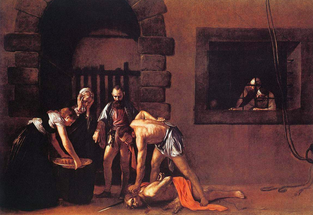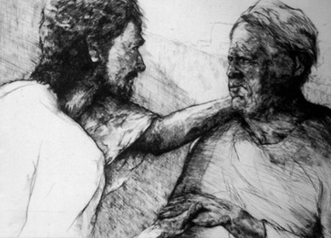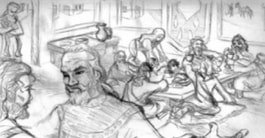 The mission summary frames the Mark 3 commission My syntactical conclusion developed above—the authority to cast out the demons (3:15) is the content of to preach (v. 14c)—is made more evident by the Mark 3 commission’s link to the Mark 1:14–15 mission summary: “Now after John had been taken into custody, Jesus came into Galilee, preaching the gospel of God, and saying, ‘The time has been fulfilled, and the kingdom of God has come near; repent and believe in the gospel.’”[1] The geographic identifier--Jesus came into Galilee (1:14b)—indicates that these two verses form a summary for the Galilean ministry that runs from the fisher-promise--And He was going along the Sea of Galilee . . . Jesus said to them, “Come follow (after) Me and I will create you to become fishers . . . ” (1:16–17, author’s translation)—through 9:33–49, a teaching episode set in the Galilean town of Capernaum (9:33).[2] These geographic bookends focus the mission summary at a literary level on Jesus’ Galilean ministry, forming an underlying relationship between “preaching the gospel of God” (1:14c) and Jesus’ teaching and actions emplotted throughout the narrative. Furthermore, the central role of Jesus’ casting-ministry is also clearly established by a casting-event bracket, first at the opening of the Galilean ministry (1:21–27) and, then, at the close (9:38–41) as Jesus begins turning his attention toward Jerusalem and the soon approaching passion. This bracketing affirms the importance of “casting” activities in the Galilean section of the Gospel narrative: the first time Jesus “came preaching the gospel of God” (1:14c) in Galilee involved an exorcism (1:21–28) and at the close of the Galilean ministry even those outside the inner-circle, who acted out the mission of Jesus, are associated with “casting” (9:38–41). Mark 1:14–15 is clearly a summary and it functions as a programmatic and interpretative lens for his Gospel narrative and for the ministry of Jesus that was carried out through both teaching and miracle that reveal the nature and significance of the kingdom that has come near (1:15). The content of the gospel of God (v.14c) is epexegetically explained in 1:15.[3] The gospel that has come from God (1:14c)[4] is defined by each element in verse 15, clarifying God’s decisive action in the appearance of his Son.[5] The mission summary is composed of two parts: first, an indication that Jesus had preached “the gospel of God” (v. 14); then, the content of that preaching (v. 15). The Mark 3 commission follows the same pattern set by Mark 1:14–15.
The gospel of God (1:14–15) and the Mark 3 commission both are announcement in which the content is the arrival of the kingdom of God and, as well, its implications. The content of the gospel of God (1:14) that Jesus preached is summarized in declarations (v. 15) that Mark has carefully balanced, forming two pairs of statements “each constructed in synthetic parallelism.”[7]
The first pair are declarative statements, each containing a perfect indicative verb that implies a completed action that continues in effect; the second are present imperatives—commands—that flow from the declarations. The first indicative is the time has been fulfilled, which corresponds to the first imperative “repent.” The second indicative is the kingdom of God has come near, which corresponds to the second imperative “believe.” The meaning is rather straightforward: the time of the old age has been completed (cf. this present evil age, Gal 1:4), that is, the time under Satan’s dominion has come to its eschatological end; and, the time of God’s kingdom has now been inaugurated, reorienting the realms of humankind to reflect his right to reign and rule.[9] The pattern established in 1:14–15 is exactly what happens throughout the Galilean ministry and is reflected in the Mark 3 commission. Timing and the evangelistic task of fisher-followers The question of timing is relevant, for the summary (Mark 1:14–15) informs us that both the time has been fulfilled and the kingdom of God has come near (author’s translation). Discussions regarding the “time” fulfilled and the “nearness” of the kingdom typically focus on chronology: do these references indicate present or future events? Mark, however, uses the word kairos (time) to indicate a decisive moment (12:2; 13:33) or a span of current time (i.e., a season; 10:30; 11:13). Mark’s use of near (eggizo centers on proximity (11:1; 14:42). These are significant observations, for at the literary level, Mark’s narrative portrait of Jesus’ “preaching of the Gospel of God” (1:14c) and its content (v. 15) parallel his immediate and proximate actions during the Galilean ministry: the end of Satan’s dominion and the inaugural reign of God are demonstrated in Jesus’ authority to cast out demons and through his other miracles as well. A number of interrelated events follow the mission summary that stress arrival (i.e., the kingdom has come near). This is a function of the following miracle stories, particularly the casting, that demonstrate “God’s rule had entered into history.”[10] The weight of the narrative parts (i.e., the episodes, stories, and events throughout the narrative) indicates the timing is immediate in Jesus’ ministry and, then, will continue through the authority to cast granted to the fisher-followers (3:15; 6:7), who are commissioned to imitate Jesus’ mission. This fits the use of the perfect indicative verbal expressions in the mission summary (peplerotai, has been fulfilled; eggiken, has come near), the subsequent narrative (i.e., the Galilean ministry), and the Mark 3 commission. The kingdom of God is the substance of the created fisher-followers’ evangelistic activities, not solely as proclamation, but primarily their actions (i.e., their deeds), which continuously reveal the kingdom’s nearness. Like the word sowed by the Master Sower in the Mark 4 parables and Jesus’ kingdom-deeds (i.e., deed-parables), this, too, is the evangelistic task of fisher-followers. The significance of the Mark 3 commission It is not coincidental that the fisher-promise (1:17) follows the mission summary (1:14–15), for the Mark 3 commission is the inaugural fulfillment of the fisher-promise and echoes the pattern set forth in the mission summary. The “casting” episodes act as indicators that the time has been fulfilled and the kingdom has come near (1:15), for Jesus is already invading Satan’s territory. The role of fisher-followers is to imitate Jesus’ activities: as Jesus was the premier inaugurator of the kingdom of God, thus ending Satan’s dominion, which is demonstrated through casting, so, also, the fisher-followers (3:15). This is the significance of the Mark 3 commission: to be obedient to the commission, then, is to develop authoritative application through analogous deeds that demonstrate the defeat of Satan’s kingdom and that reorient both people and the world toward God’s dominion. The final interpretive summary (III) below gives a sense of this fuller understanding of the Mark 3 commission and its significance for the reader/listener today:
[1] The Mark 1:14–15 text here reflects my translation of the Greek, which will be used throughout the remainder of this section, unless otherwise noted. [2] Although most limit the Galilean ministry to Mark 1–6 (note for example Guelich, Mark 1–8:26, 41; Witherington, Gospel of Mark, 77), it appears that it continues through to Mark 9, which is indicated by the geographic bookends. [3] Guelich, Mark 1–8:26, 43. [4] Regarding the phrase to euaggelion tou theou (the gospel of God, Mark 1:14c), the genitive tou theou (of God, Mark 1:14c) is most likely used ambiguously by Mark to mean both the Gospel about God (objective genitive) and the gospel from God (subjective genitive). Nonetheless, here I indicate that the phrase to mean “the gospel from God” emphasizing God’s action in Christ Jesus, his appearance and ministry (e.g. see France, Gospel of Mark, 91). [5] Lane, Gospel According to Mark, 63–64; Witherington, Gospel of Mark, 77. [6] Along with Mark 1:14–15, the Mark 3:14–15 reference here reflects the author’s translation. [7] Guelich, Mark 1–8:26, 41; also Marcus, Mark 1–8, 175. [8] See Marcus, Mark 1–8, 175; this gird reflects the author’s translation of Mark 1:15. [9] On this I follow Marcus, who has a good discussion on the meaning of the mission summary (Mark 1–8, 173–76). [10] Ibid., 46.
0 Comments
Think about this: In Mark 1:40-45, Jesus touches the leper BEFORE he makes him clean. This order is everything—and it is instructive to us as church. Typically, both as individuals and as church (and I mainly want church to hear this), we welcome others into our circle of affections after they are clean first—then we touch (welcome, embrace). Here in Mark 1, Jesus is approached by a leper and touches him and then he makes him clean. Everyone else saw a leper; Jesus saw a human being. This is church, people. We welcome others into our circle of affections and care and embrace before we judge or evaluate them. We see human beings, made in the image of God, first. This order is everything. This is the gospel. This is church. And, if we want to have people freely talk about us (our church) and the news of our gospel to spread, this order is everything—and then we will see people coming to Jesus from “every quarter,” every neighborhood.
When Jesus called his disciples to “follow me and I will make you become fishers of men” (Mark 1:17), most assume a positive evangelistic outcome of reaching people for Christ. Nothing could be further from the reality behind Jesus’ intentions in calling out followers to be such witnessing-fishers. At least the benign, banal application of making this verse a proof-text for “witnessing” is a shallow and narrow application of Jesus’ powerful imagery cast in this tremendous text.
Tax collectors are outsiders; rich they might have been, but they were in the eyes of temple leadership, traitors to God and to God’s people. Yet, the sinners are most certainly the uneducated serfs and peasants, farmers, and those who lived on the margins of life in and around Jesus’ house in Capernaum of Galilee (2:15). One cannot spin from this text a general characteristic that “sinners” are all sinners anywhere you find them. As are the "tax collectors," they are a specific demographic associated with those living as the poor and marginal of Jesus’ day. Jesus’ response, then, takes on an ominous shadow—a fisher shadow, standing on the shore, cast into the waters of those that are "healthy." True fisher-followers of Jesus will not rationalize their standing in the community nor their affluence, but will count their privilege, their advantage, at the disposal of the “sick” who need a physician. Paul is not far from the same imagery when he describes how Jesus took his advantage (his privilege) and gave it all on behalf of all those with the greatest of disadvantage. Have this attitude in yourselves which was also in Christ Jesus, who, although He existed in the form of God, did not regard equality with God a thing to be grasped, but emptied Himself, taking the form of a bond-servant, and being made in the likeness of men. Being found in appearance as a man, He humbled Himself by becoming obedient to the point of death, even death on a cross (Phil 2:5-8). Most likely Amos 4:1-2 is one of the underpinning Old Testament referents that would have given the disciples a frame, a rather menacing edge, for understanding the potency of Jesus’ call on their lives. In view of the inclusion (contextually) of Amos 4:1, namely the “cows of Bashan” referent, I have become wary of the poorly distributed resources, talents, and wealth among the richer, more affluent churches at the expense of the poorer churches, neighborhoods, and urban mission fields. By “expense” I am thinking biblically, not culturally, socially or (heaven forbid) politically, nor through the lens of class, but by the very New Testament discipleship implications, namely that those with advantages (“privilege,” if I may) who are called by their association with Jesus to help those who are at a disadvantage. The assumption that it takes more money to reach the rich and affluent than the poor is turned on its head by the very presence of the Kingdom (cf. Mark 1:17 with Mark 1:14-15). A more gospel-centered and mature view of discipleship seem to argue that it takes far more resources to go into the poor urban fields to bring forth a harvest for the gospel of the kingdom. These are under-resourced communities in every imaginable aspect of life. As affluent Christians, we tend to justify our station in life as a combination of gift and hard work and hear any talk of “privilege” as a justification of those of lesser means, with poorer gifts, and perhaps, with what we perceive, a lesser work ethic to grab what we have for themselves. Is there no wonder the affluent in the days of both Amos and Jesus attempted to rid themselves of the troublemakers who upset the "healthy's" status quo? This will be the lot of fisher-follows of Jesus in any culture. Following Jesus, as the gospel is imagined by Mark (and the other Gospel writers), put us at odds with everything we hold dear, in particular those who have the advantage in resources are to empty themselves on behalf of those who are at a disadvantage (cf. Phil 2). The fisher-follower mission is toward the sick (of our society), not the healthy (in our society)—toward the disadvantaged and not the advantaged. Michael Card prophetically reflects this Marken view of Jesus and the gospel in the words of his song, The Stranger:
For a youtube of Michael Card's "The Stranger" >> Click here *See chapter 3, “‘You Will Appear as Fishers’ (Mark 1:17): Disciples as Agents of Judgment,” in my Wasted Evangelism for a further and more detailed study of the Mark 1:17 “fishers of men” passage.
|
AuthorChip M. Anderson, advocate for biblical social action; pastor of an urban church plant in the Hill neighborhood of New Haven, CT; husband, father, author, former Greek & NT professor; and, 19 years involved with social action. Archives
February 2024
Categories
All
|
Pages |
More Pages |
|


 RSS Feed
RSS Feed